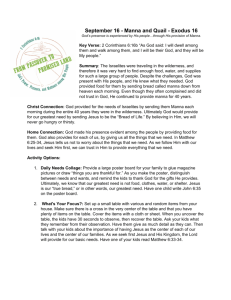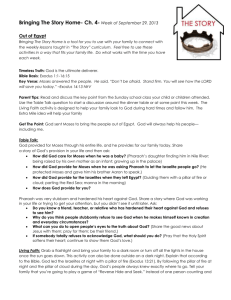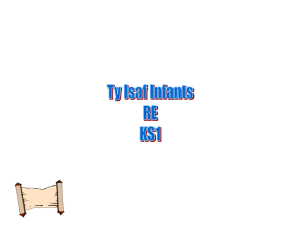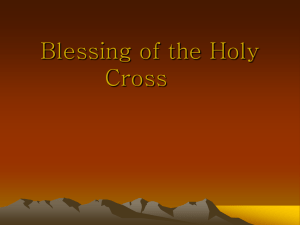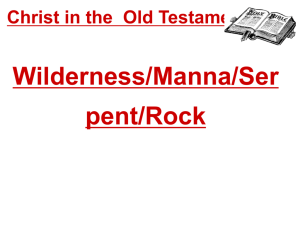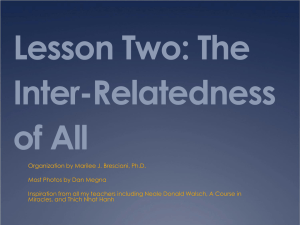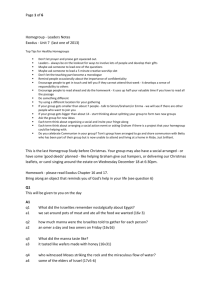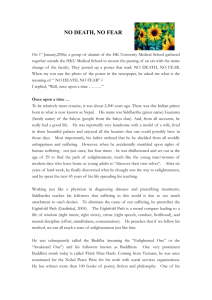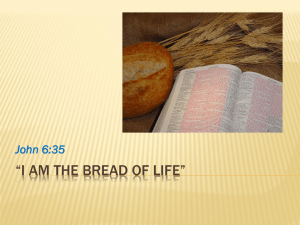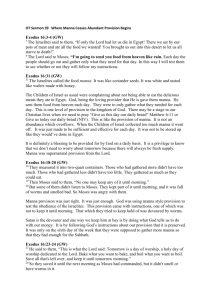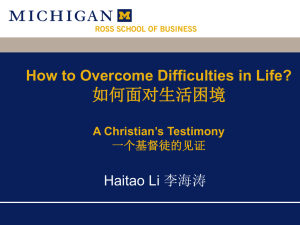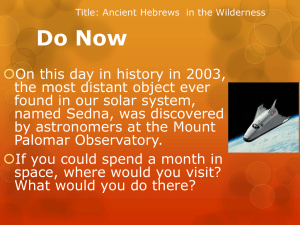25 Ordinary - Cherokee Park United Church
advertisement
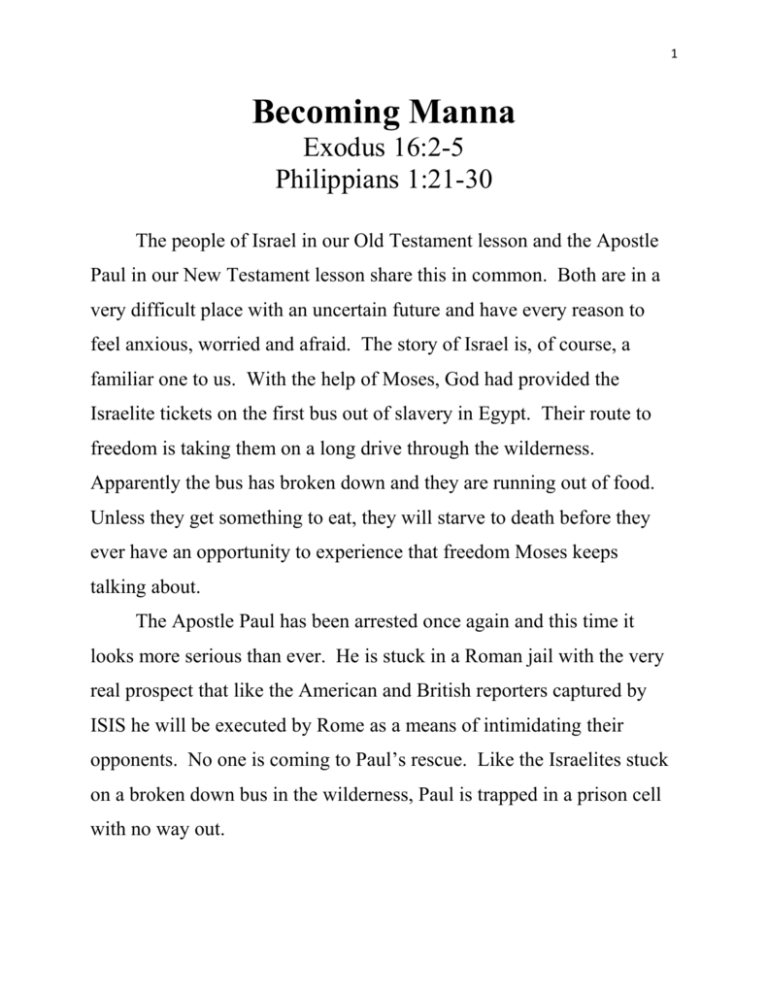
1 Becoming Manna Exodus 16:2-5 Philippians 1:21-30 The people of Israel in our Old Testament lesson and the Apostle Paul in our New Testament lesson share this in common. Both are in a very difficult place with an uncertain future and have every reason to feel anxious, worried and afraid. The story of Israel is, of course, a familiar one to us. With the help of Moses, God had provided the Israelite tickets on the first bus out of slavery in Egypt. Their route to freedom is taking them on a long drive through the wilderness. Apparently the bus has broken down and they are running out of food. Unless they get something to eat, they will starve to death before they ever have an opportunity to experience that freedom Moses keeps talking about. The Apostle Paul has been arrested once again and this time it looks more serious than ever. He is stuck in a Roman jail with the very real prospect that like the American and British reporters captured by ISIS he will be executed by Rome as a means of intimidating their opponents. No one is coming to Paul’s rescue. Like the Israelites stuck on a broken down bus in the wilderness, Paul is trapped in a prison cell with no way out. 2 What do you do when facing those situations where you feel powerless, like life is out of your control, and you are completely at the mercy of decisions made by someone else or circumstances over which you have no influence? There is no need to be on that broken down bus with the Israelites in the wilderness or the Apostle Paul in prison to feel what they must have felt. On any given day we can be gripped by a sense of panic that something we consider to be of tremendous importance will turn out badly. The other evening I woke up about 2 a.m. thinking about something that was worrying me. Those middle of the night thoughts are like those old Saturday Night Live sketches making fun of the movie Jaws. Someone hears a gentle knock on the door. In the background you hear the theme from Jaws playing quietly. The person answers the door, “who is it?” To which the shark on the other side of the door deceitfully responds, “Candygram..Candygram.” The person opens the door and before he knows it he is being devoured by the shark. That’s what those mid-night worries are like. They sort of creep into our consciousness and before you know it we are consumed by worry. My strategy is to go downstairs and have something to eat, with maybe a little milk. Michele reads the paper. I think my strategy is better. If everything unfolded according to our design, our dreams and hopes than there would be no reason for worry or fear. But, whose life ever unfolds in the way we have planned or dreamed? Those of us who 3 have been watching the documentary the Roosevelts have all week been reminded of how life can turn out differently than we expect or desire. During the depths of the great depression millions of people were filled with anxiety and fear about how they could put bread on the table or create a future for their children. Theodore, Eleanor and Franklin Roosevelt each faced major life disappointments, heartaches and loss that they would have never chosen. For each of them it began as children and youth, even with all their wealth, feeling isolated, alone, by themselves. When you are standing at that point in time where the bus has broken down in the wilderness and you are out of food, the prison door has been locked and no one will pay your bail, it looks at that point like the end of your dreams and hopes. Disappointment and loss stare us in the face. I want so badly to be on the swim team, the soccer team, the band, to be included with the fun kids, to get into a particular college, to get that job that I know is a perfect fit, to have the elections results turn out as dreamed, to have that Hollywood relationship of continuous bliss, to feel financially secure about retirement, to have our children and grandchildren be happy and safe. There are no shortage of things that can wake us up in the middle of the night, devouring us with worry and fear. Who can blame the Israelites for saying to Moses, “If only we had died in the land of Egypt. We had it so good there, pots full of turkey 4 stew and more bread than we could possibly eat. But, out here in the wilderness all we have left is musty old white flour and we are about to run out of that.” This, of course, is distorted middle of the night thinking, because Scripture tells us their Egyptian task masker beat them with whips and sparingly handed out moldy pieces of bread when they felt like it. When you are worried about the future, it is easy to begin idealizing the past into something it never was. Most of us can relate to the response of the Israelites on that broken down bus, short on food, complaining mightily about our situation, angry with whomever we might assign blame. What we find it hard to understand is the response of Paul. Paul is in prison, facing the prospect of an execution every bit as grisly as the ones being reported by ISIS. Here’s how Paul responds, “For me, living is Christ and dying is gain…I do not know which I prefer, I am hard pressed between the two.” How is it possible for Paul to be so accepting of either outcome? This is his life we are talking about. Of all the possible outcomes in which we have a particularly strong investment, it would be living, rather than dying. Yet, somehow, Paul is able to say, “I can go either way.” How is that possible? We need to pay close attention here, because this is challenging stuff to embrace. In his book Living Buddha, Living Christ, Buddhist monk Thich Nhat Hahn tells us that healthy detachment, letting go of specific outcomes, is at the core of inner peace, while holding onto 5 specific outcomes is a source of suffering. Saint Ingatius, of Loyola, founder of the Jesuits, found this Buddhist principle of detachment completely in keeping with Christian practice. Ignatius says, “We should not fix our desires on health or sickness, wealth or poverty, success or failure, a long life or a short one. Our one goal is the freedom to make a wholehearted choice to follow God." For Ingatius, like Thich Nhat Han, healthy detachment from specific outcomes is the path to inner peace. Both Ingatius and Thich Nhat Han insist that it is our worry about the future, our obsessing about the past, that keep us from living in the present. Here is what Thich Nhat Han says, “Most of the time, we are lost in the past or carried away by future projects and concerns. When we are mindful, touching deeply the present moment, we can see and listen deeply, and the fruits are always understanding, acceptance, love and the desire to relieve suffering and joy.” The apostle Paul was living in the present moment, with a complete detachment from outcomes over which he had no control and so he could say, life or death, I can go either way. It is because God knows the only way to true freedom for the Israelites is by living in the present, letting go of past obsessions and future worries, that God says, I will give you manna each day, one day at a time. The only exception is the Sabbath when you give up all illusion 6 of control and simply rest in my presence. Let go of your worry and trust I will provide, day by day. Thich Nhat Hahn reminds us “the most precious gift we can give one another is our presence. When our mindfulness embraces those we love, they will,” he says, “become like flowers.” This morning we are celebrating Building Blocks Tutorial a wonderful opportunity for nurturing flowers. The purpose of the program is to help our children achieve academically, but the method, the means for encouraging them and supporting them is by having tutors who are fully present to them, in the moment, not thinking about what the tutors did earlier in the day or worry about what the tutors will do when they go home, but fully present to these important children right then and there. By living in the moment, by trusting God will provide, we not only receive manna, bread from heaven, but we also become manna for one another. We are nourished, we are strengthened in community when we let go of our worries, our anxieties, our fears and trust the presence of God’s spirit to be at work in and through us. In receiving the manna of God’s grace, we become the manna for one another. 7 Exodus 16:2-15 In our first lesson from Exodus we encounter the Israelites in one of those awkward moments when they are complaining to Moses about how Moses and God have let them down. They have escaped slavery in Egypt only to found themselves stranded in the wilderness without food. From their perspective, they have good reason to worry. God hears their complaints and offers them manna, bread from heaven. Yet, God still expects that they will learn to trust and so there is only enough manna for each day. The whole congregation of the Israelites complained against Moses and Aaron in the wilderness. The Israelites said to them, "If only we had died by the hand of the Lord in the land of Egypt, when we sat by the fleshpots and ate our fill of bread; for you have brought us out into this wilderness to kill this whole assembly with hunger." Then the Lord said to Moses, "I am going to rain bread from heaven for you, and each day the people shall go out and gather enough for that day. In that way I will test them, whether they will follow my instruction or not. On the sixth day, when they prepare what they bring in, it will be twice as much as they gather on other days." Philippians 1:21-26 In our second lesson comes from a letter to the Philippians while he is in prison, facing the very real possibility of execution. Amazingly, Paul approaches his incarceration and the threat of death as if it is a choice he has to make and he is undecided about what he would prefer. For to me, living is Christ and dying is gain. If I am to live in the flesh, that means fruitful labor for me; and I do not know which I prefer. I am hard pressed between the two: my desire is to depart and be with Christ, for that is far better; but to remain in the flesh is more necessary for you. Since I am convinced of this, I know that I will remain and continue with all of you for your progress and joy in faith, so that I may share abundantly in your boasting in Christ Jesus when I come to you again.
